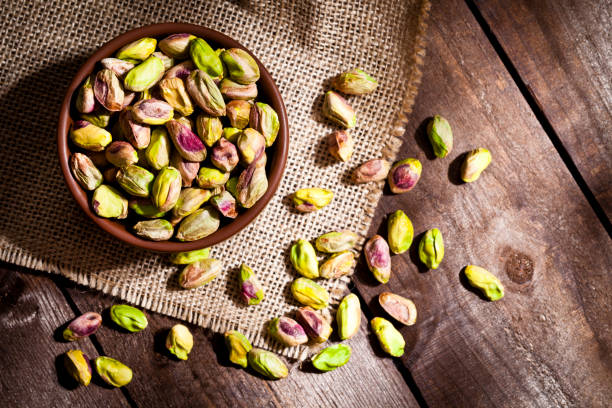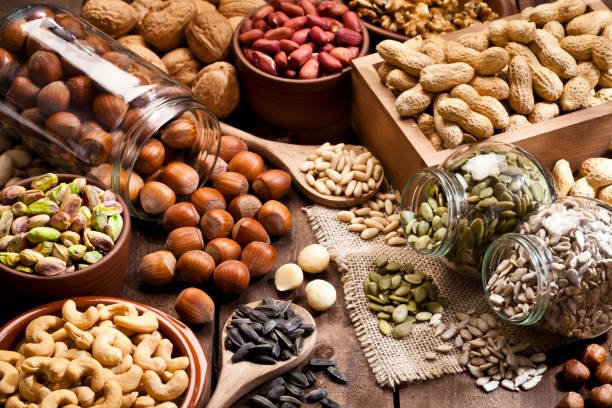This post contains affiliate links, meaning that I may receive compensation if you make a purchase through these links. As an Amazon Associate, I earn from qualifying purchases. This compensation does not influence the content, or recommendations provided. The opinions expressed are my own, and I strive to provide honest and unbiased information.
Nuts and seeds are more than just crunchy snacks; they are nutritional powerhouses packed with essential vitamins, minerals, healthy fats, and proteins. Whether you’re looking to boost your heart health, manage weight, or simply incorporate more nutrients into your diet, nuts and seeds can be a versatile and tasty addition to your meals. This blog post will explore the nutritional benefits of some of the most well-known nuts and seeds, providing you with a concise yet informative guide to their value.
1. Almonds
Nutritional Highlights:
– Healthy Fats: Almonds are rich in monounsaturated fats, which are heart-healthy fats that help reduce bad cholesterol levels.
– Vitamin E: A powerful antioxidant, almonds provide about 37% of the recommended daily intake of vitamin E, promoting skin health and protecting cells from oxidative stress.
– Fiber and Protein: A handful of almonds offers around 3.5 grams of fiber and 6 grams of protein, making them a filling snack that supports digestion and muscle maintenance.
Health Benefits:
Almonds are known to aid in weight management due to their satiating properties. They also support heart health by reducing LDL cholesterol and improving blood lipid levels.
2. Walnuts
Nutritional Highlights:
– Omega-3 Fatty Acids: Walnuts are one of the few nuts rich in alpha-linolenic acid (ALA), a plant-based omega-3 fatty acid essential for heart and brain health.
– Antioxidants: These nuts are packed with polyphenols, a type of antioxidant that helps combat inflammation and oxidative stress.
– Melatonin: Walnuts contain melatonin, a hormone that regulates sleep, making them a good choice for improving sleep quality.
Health Benefits
Regular consumption of walnuts is linked to improved brain function, reduced risk of heart disease, and better sleep patterns. Their anti-inflammatory properties also make them beneficial for managing chronic diseases.
3. Cashews
Nutritional Highlights:
– Copper: Cashews are an excellent source of copper, providing over 30% of the daily recommended intake per ounce. Copper is vital for energy production, brain development, and a healthy immune system.
– Magnesium: Magnesium in cashews supports bone health, nerve function, and muscle relaxation.
– Healthy Fats: Like almonds, cashews are rich in heart-healthy monounsaturated fats.
Health Benefits:
Cashews can help boost energy levels and improve bone health. Their healthy fat content also contributes to cardiovascular health, while magnesium aids in stress management.
4. Pistachios

Nutritional Highlights:
– Protein: Pistachios are one of the highest-protein nuts, offering about 6 grams per ounce, making them a great snack for vegetarians and vegans.
– Fiber: High in fiber, pistachios promote digestive health and help regulate blood sugar levels.
– Lutein and Zeaxanthin: These antioxidants are essential for eye health, helping to protect against age-related macular degeneration.
Health Benefits:
Pistachios support heart health by improving cholesterol levels and blood pressure. Their fiber content aids in digestion, while their antioxidants support eye health.
5. Sunflower Seeds
Nutritional Highlights:
– Vitamin E: Sunflower seeds are a top source of vitamin E, providing nearly 49% of the daily recommended intake per ounce.
– Selenium: These seeds are rich in selenium, a mineral that supports thyroid function and acts as an antioxidant.
– Healthy Fats: Sunflower seeds are packed with polyunsaturated fats, including linoleic acid, which is beneficial for heart health.
Health Benefits:
Sunflower seeds help reduce inflammation and support cardiovascular health. Their high vitamin E content also makes them great for skin health, while selenium aids in thyroid function.
6. Chia Seeds
Nutritional Highlights:
– Fiber: Chia seeds are a fiber powerhouse, with nearly 10 grams per ounce. This high fiber content promotes digestive health and helps with weight management.
– Omega-3 Fatty Acids: These seeds are an excellent plant-based source of omega-3 fatty acids, supporting heart and brain health.
– Protein: Chia seeds offer 4 grams of protein per ounce, making them a good plant-based protein source.
Health Benefits:
Chia seeds are known for their ability to support digestive health, regulate blood sugar levels, and provide sustained energy. Their omega-3 content also contributes to heart health.
7. Flaxseeds
Nutritional Highlights:
– Omega-3 Fatty Acids: Flaxseeds are one of the richest sources of ALA, supporting cardiovascular health and reducing inflammation.
– Lignans: These seeds contain high levels of lignans, compounds with antioxidant properties that may reduce cancer risk.
– Fiber: Flaxseeds are high in both soluble and insoluble fiber, aiding in digestion and promoting a healthy gut.
Health Benefits:
Flaxseeds can help lower cholesterol, support digestive health, and reduce the risk of certain cancers due to their lignan content. Their omega-3 fatty acids also play a crucial role in heart health.
8. Pumpkin Seeds
Nutritional Highlights:
– Magnesium: Pumpkin seeds are an excellent source of magnesium, a mineral essential for over 300 biochemical reactions in the body, including energy production and muscle function.
– Zinc: These seeds provide a good amount of zinc, which is important for immune function, wound healing, and DNA synthesis.
– Antioxidants: Pumpkin seeds are rich in antioxidants, including carotenoids and vitamin E, which help reduce inflammation.
Health Benefits:
Pumpkin seeds support prostate health, improve heart health, and boost immune function. Their high magnesium content also helps with muscle relaxation and stress reduction.
9. Sesame Seeds
Nutritional Highlights:
– Calcium: Sesame seeds are one of the best plant-based sources of calcium, essential for bone health and muscle function.
– Iron: These seeds are also rich in iron, supporting red blood cell production and preventing anemia.
– Lignans: Like flaxseeds, sesame seeds contain lignans, which have antioxidant and anti-inflammatory properties.
Health Benefits:
Sesame seeds support bone health, improve blood circulation, and may reduce the risk of certain cancers due to their lignan content. Their iron content also helps prevent anemia.
10. Brazil Nuts
Nutritional Highlights:
– Selenium: Brazil nuts are one of the richest dietary sources of selenium, providing more than 100% of the daily recommended intake per nut. Selenium is crucial for thyroid function and acts as a powerful antioxidant.
– Healthy Fats: These nuts are rich in healthy fats, particularly monounsaturated and polyunsaturated fats, supporting heart health.
– Vitamin E: Brazil nuts also offer a good amount of vitamin E, promoting skin health and protecting against oxidative damage.
Health Benefits:
Brazil nuts support thyroid health, boost the immune system, and improve heart health. Their selenium content also plays a role in cancer prevention and reducing inflammation.
Incorporating Nuts and Seeds into Your Diet

Nuts and seeds are incredibly versatile and can be easily incorporated into your daily diet. Here are some ideas:
–Snacking: Enjoy a handful of mixed nuts as a quick, nutrient-dense snack.
-Salads: Sprinkle sunflower or sesame seeds on top of your salads for added crunch and nutrition.
-Smoothies: Add chia seeds or flaxseeds to your smoothies for an extra boost of fiber and omega-3s.
-Baking: Use almond or cashew flour as a gluten-free alternative in baking recipes.
-Breakfast: Mix nuts and seeds into your oatmeal or yogurt for a hearty, nutritious breakfast.
Conclusion
Nuts and seeds are small but mighty when it comes to nutrition. By incorporating a variety of these nutrient-rich foods into your diet, you can enjoy numerous health benefits, from improved heart health to better digestion and beyond. Whether eaten on their own or added to your favorite dishes, nuts and seeds are a delicious way to boost your nutrient intake and support overall health.
So, the next time you’re looking for a healthy snack or an easy way to enhance your meals, reach for a handful of nuts or seeds—they’re nature’s perfect little packages of nutrition.
For information on Snacking options, read: Healthy Snacking is Possible


